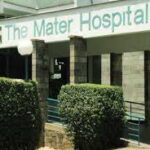Kapsowar Hospital
ABOUT THE HOSPITAL

Kapsowar Hospital is a small mission hospital based in North West Kenya.
Kapsowar Hospital was first established by Africa Inland Mission (AIM) in 1933. In 1963, AIM handed over ownership of the hospital to the Africa Inland Church (AIC), and is currently under the supervision of the AIC Central Health Council. Since the Marakwet District came into existence in 1994, Kapsowar Hospital continues to supply the majority of medical care to the people of the area with a goal to provide excellent health care to the glory of God.
ABOUT KAPSOWAR
Kapsowar is a small village within the Marakwet District of the North Rift Valley Province. It is situated on the eastern edge of the Cherangani hills overlooking the Kerio Valley. At an altitude of about 7800 feet, and temperatures daily between 60 to 80 degrees (16 – 29 degrees centigrade), the climate is quite pleasant.
Days are usually warm, but the evening and night temperatures can be chilly. There are heavy rains from April through August, with July and August being the coolest months. Most rain falls at night and days are sunny.
Most of the population of Kapsowar are the Marakwet, a Kalenjin sub tribe. The original inhabitants in Kapsowar originate from different clans. Among the most prominent clans are Kapterik, Talai, and Kapswahili. The Kapswahili clan were originally immigrants from Tanzania.
MORE INFORMATION
The 140-bed multi-building hospital provides facilities for maternity, pediatric and medical and surgical care. The hospital compound is comprised of 12 hospital buildings and 22 staff residences. A nursing school was built in 2008 and accepted its first class of students in August 2008. The hospital has a US trained general and plastic reconstructive surgeon, a US trained OB/GYN, two US trained family practice physicians and two Kenyan trained family practice physicians. The physicians are supported by many Kenyan trained nurses and staff. The number of expatriate staff varies greatly depending on the number of visitors many of whom are medical students or other visiting doctors or nurses. The hospital receives a number of elective students and visiting professionals through AIM, Samaritan’s Purse/World Medical Mission, and various other organizations.
The hospital has its own accommodation at the hospital station comprised of a number of staff houses and a hostel, which are managed by the station manager.
The hospital is overseen by a Board of Governors, as well as a Management Committee (medical director, matron, administrator, business manager, doctor, building supervisor, and chaplain).
Kapsowar’s Administration and Medical Record Department consists of a business manager, account technician, clerk, cashier, purchasing officer, and records clerk who manage the hospital’s budget along with the medical director. This department collects fees from both inpatients and outpatients. Since this is the hospital’s main source of revenue, it is an extremely vital phase of administrative duties.
The hospital’s domestic department includes a maintenance supervisor, carpenters, plumbers, a mason, an electrician, and a varying number of casual workers. The hospital has dairy cows which supply the majority of milk for daily needs.
All staff employed at Kapsowar are Christians, and full-time chaplains are stationed at the hospital as well. Their desire is that patients will come to a greater knowledge of the Gospel during their stays, whether through ward services or by talking to staff.
Kapsowar seeks to acquire more Kenyan Christian qualified medical staff, including physicians, and invites Kenyan medical students to do electives there in the hope that they will return to serve God and their own people. Although staff recruitment has been a difficult task in this remote area, volunteer doctors have provided immense help in patient care, and medical students have given valuable assistance in screening and administering medical care.
Overall, the primary mission of Kapsowar Hospital is to be a witness for and to glorify the Lord Jesus Christ by offering compassionate medical care to those who need health services. This mission is found in the following purpose and objectives as outlined in the hospital’s constitution:
THE PURPOSE OF THE HOSPITAL SHALL BE:
- To provide both physical and spiritual healing in the Name of Jesus Christ
- To maintain the best possible standards within the limits of the local situation, maintaining as minimum standards acceptable to the Director of Medical Services of the Kenya Government
THE OBJECTIVES OF THE HOSPITAL ARE:
- To fulfill the purpose by proclaiming the Gospel of Jesus Christ to give patients the opportunity to accept Him as their personal Savior and to deepen the spiritual lives of Christians
- To provide competent medical and surgical aid to the sick for the promotion of health through compassionate curative and preventive services and spiritual enlightenment.
HOSPITAL SERVICES
The 140-bed, multi-building hospital provides facilities for maternity, pediatric, medical, and surgical care. There are six adult wards of 18 – 20 beds each
- 36 male beds
- 33 female beds
- 38 OB/GYN beds
INPATIENTS AND MATERNITY

Kapsowar Hospital totals approximately 4000 – 5000 admissions per year (931 male, 1052 female, 1199 maternity and 738 children). The most common in-patient diagnoses for male patients coming to the hospital range from malaria, injuries, fractures, and pneumonia. The hospital delivers around 1500 babies per year with around 300 by caesarean section.
Malaria is still the number one admitting diagnosis at Kapsowar Hospital, and variations in the altitude of this region tend to affect disease patterns. In the valley below, malaria is epidemic, as well as Leishmaniasis and occasionally malnutrition. At Kapsowar, malaria occurs chiefly during the raining season, although it continues to be an increasing problem. Even in the highlands, it is becoming more common.



